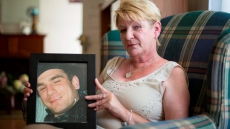VANCOUVER — Canadian researchers are one step closer to uncovering a biomarker associated with fetal alcohol spectrum disorder after identifying distinct patterns associated with the DNA of children who were exposed to alcohol in the womb.
The investigation, led by the University of British Columbia, analyzed DNA samples from 110 children with fetal alcohol spectrum disorder across the country.
"We're entering into a new era where having insights into what's going on behind these neurodevelopment disabilities, and FASD in particular, isn't a matter of us throwing up our hands and saying there's nothing we can do," said Daniel Goldowitz, scientific director of the Kids Brain Health Network.
"In fact, everything indicates that there is a lot that we could do."
The study relied on data collected through the network, a national collaboration that aims to improve the understanding and treatment of neurodevelopment disorders, such as fetal alcohol spectrum disorder and autism.
The findings were published earlier this summer in the journal Epigenetics and Chromatin.
Fetal alcohol spectrum disorder is an umbrella term used for a range of irreversible cognitive and physical disabilities that a baby is born with as result of a woman consuming alcohol during pregnancy.
Studying the effect prenatal alcohol exposure has on a person's DNA can lead to better assessment and diagnostic techniques, Goldowitz said.
The study co-author, Prof. Elodie Portales-Casamar of the University of British Columbia's pediatrics department, said the findings are a first step in understanding the underlying mechanisms that alcohol exposure has on brain development.
The study looked at two million genetic markers and another 450,000 epigenetic markers, which control the activity of DNA.
Portales-Casamar said the research team found that methylation, a process that affects how genes behave, differed for children who have fetal alcohol spectrum disorder.
Michael Kobor, a professor of medical genetics at the university, likened methylation to a dimmer for a light bulb, regulating its activity to control how bright or active a gene is.
A number of environmental factors can affect gene behaviour, resulting in wide variations even when comparing the DNA of average, healthy people, Portales-Casamar said, adding that means finding patterns responsible for a particular disorder is difficult.

She said researchers have found consistent, statistically significant patterns of methylation unique to the children who were exposed to alcohol before birth compared to those who were not.
They also noticed some patterns around what parts of the genetic code were affected, Kobor said.
"It appears that some of the genes that are differentially methylated between the FASD kids and the control (group) appear to be involved in neurodevelopment and brain development and such."
Further studies of this pattern could help identify what specific parts of the DNA are affected and uncover biomarkers that would make a laboratory test possible for diagnosing the disorder, he said.
Currently, diagnosing the disorder requires a series of assessments by specialists and typically doesn't happen until children are in school, when signs of developmental or behavioural issues become apparent, Portales-Casamar said.
The ability to test DNA for signs of the disorder would allow for a much earlier diagnosis.
"Though there is no cure for FASD, early interventions can really help a lot of kids with their cognitive impairments and lots of different aspects of their lives," Portales-Casamar said of the disorder that may affect speech, learning and behaviour.
Developing a genetic test would have other benefits, Goldowitz said, adding children in remote communities may one day be diagnosed with a swab sent to a lab outside their region.
Genetic studies already done for other neurodevelopmental disorders, such as Down syndrome and autism, have uncovered biomarkers, potentially leading to treatment or even reversal of the conditions, he said.
While the research on fetal alcohol spectrum disorder is not as advanced, Goldowitz said the current findings could lead to similar developments.
"There is increasing evidence for what we would have thought as irreparable damage to the nervous system of it being turned back and intervened successfully."



